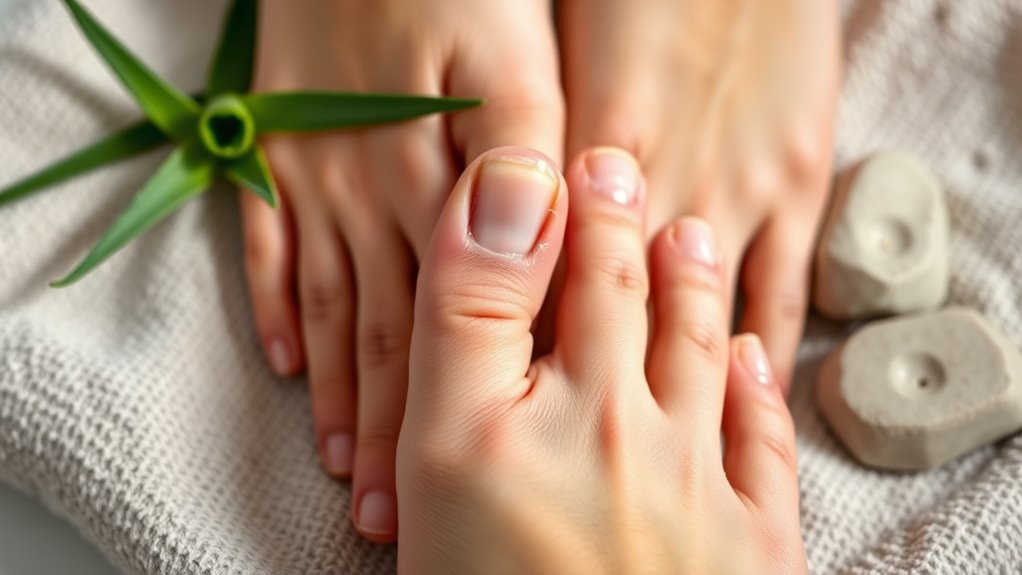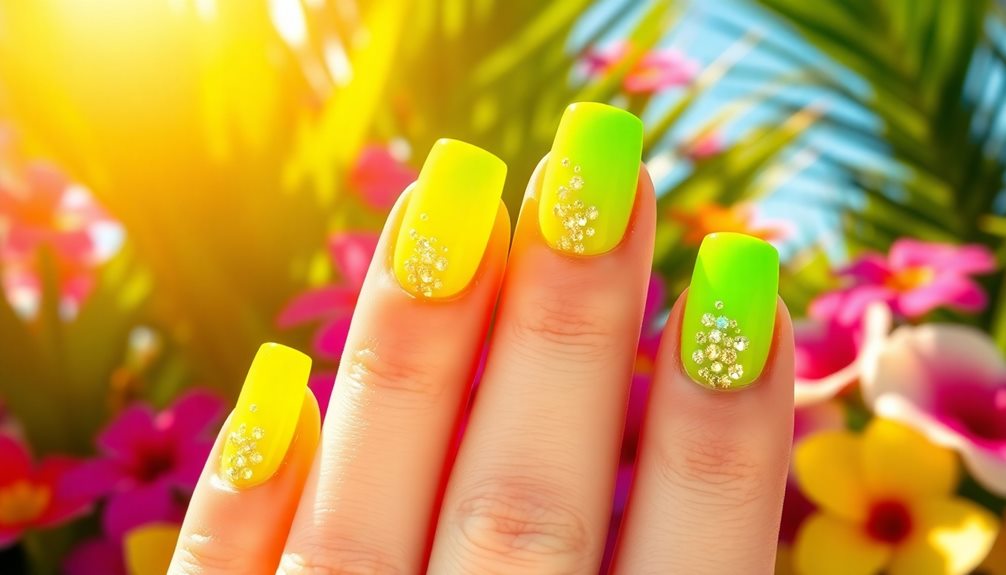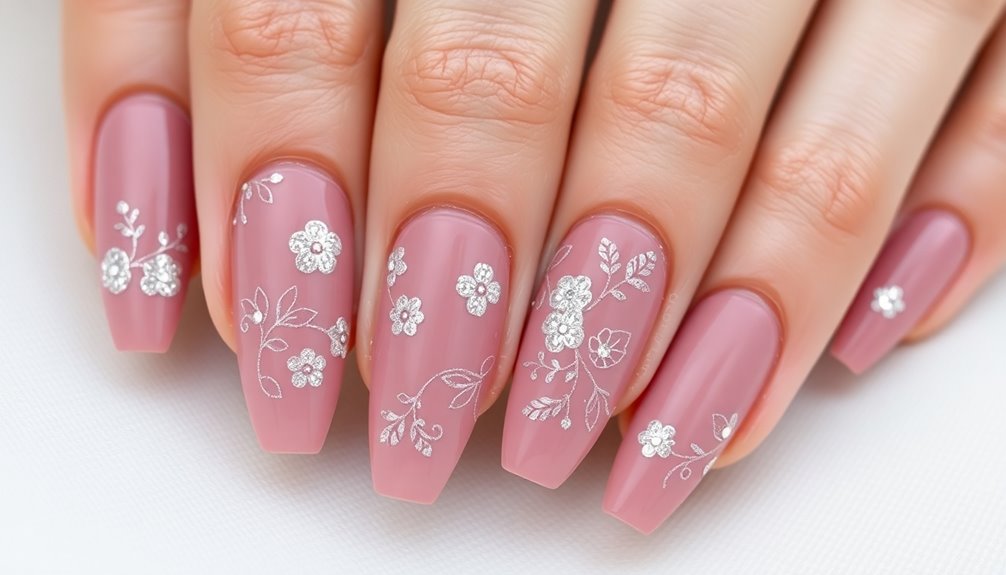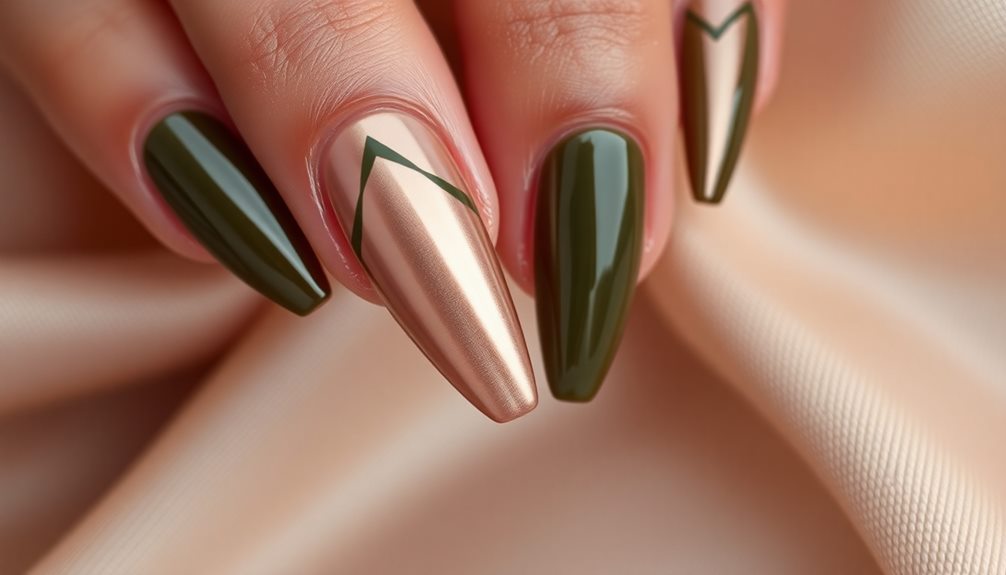To care for calluses gently, focus on softening and moisturizing your skin naturally. Soak your feet or hands in warm water with essential oils, then gently exfoliate with a pumice stone or soft brush. Apply rich moisturizers like shea butter or coconut oil daily to lock in hydration. Using aloe vera or natural masks from bananas, honey, or avocados can soothe and soften calluses effectively. Keep up these gentle methods, and you’ll discover more tips for healthy, smooth skin.
Key Takeaways
- Use natural remedies like aloe vera or mashed bananas to soften calluses gently.
- Soak feet or hands in warm water with essential oils to loosen dead skin.
- Gently exfoliate with pumice stones or soft brushes after soaking to remove thickened skin.
- Regularly moisturize with natural emollients such as shea butter or coconut oil to prevent dryness.
- Maintain consistent, gentle care routines for healthier, softer skin and reduced callus buildup.
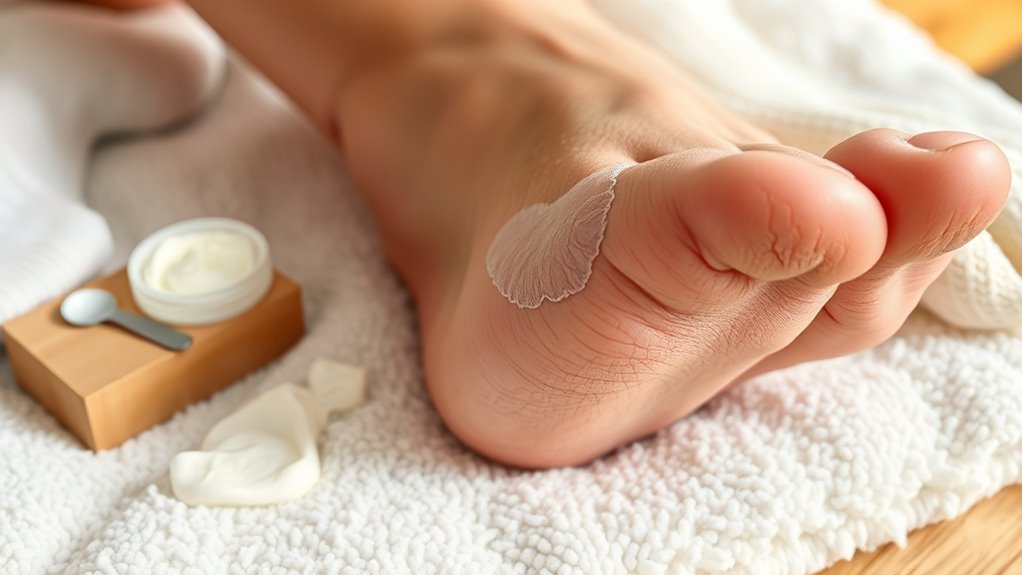
Have you ever noticed thick, rough patches of skin forming on your feet or hands? Those stubborn areas are calluses, a natural response your body has to repeated friction or pressure. While they often serve as a protective barrier, they can become uncomfortable or unsightly if left unchecked. The good news is that you can manage calluses gently and effectively using natural methods.
One of the best ways to start caring for calluses is by exploring plant-based remedies. These natural solutions are gentle on your skin yet effective in softening and reducing thickened areas. For example, applying extracts like aloe vera can soothe irritated skin and promote healing. Aloe vera contains enzymes that break down dead skin cells and hydrate your skin, making it easier to remove or reduce calluses over time. Similarly, thickening masks made from natural ingredients like mashed bananas, honey, or avocado provide nourishment and moisture, helping to soften the rough patches. These plant-based remedies are ideal if you prefer avoiding harsh chemicals, as they work in harmony with your skin’s natural healing processes.
Explore plant-based remedies like aloe vera and natural masks to soften and heal calluses gently.
In addition to using plant-based remedies, adopting proper moisturizing techniques plays a *vital* role in callus care. Dry, dehydrated skin tends to become tougher and more prone to forming calluses, so keeping your skin well-moisturized is essential. You should regularly apply a rich, hydrating moisturizer to the affected areas, ideally after bathing or soaking your feet or hands. For enhanced results, consider using thick creams or ointments containing natural emollients like shea butter or coconut oil. These ingredients create a protective barrier that locks in moisture and softens the skin, making it easier to gently exfoliate or remove calluses without causing damage. Consistency is key—by moisturizing daily, you help prevent calluses from becoming thick and uncomfortable.
You might also find that soaking your feet or hands in warm water before applying plant-based remedies or moisturizer makes a big difference. This softens the skin, allowing active ingredients to penetrate deeper and work more effectively. Adding a few drops of essential oils like tea tree or lavender to your soak can also provide antimicrobial benefits, reducing any risk of infection. After soaking, gently exfoliating with a pumice stone or a soft brush can help remove dead skin cells, but be sure not to overdo it—gentle, regular care is what makes the difference. Proper skin maintenance is also essential for preventing callus buildup and supporting overall skin health.
Ultimately, caring for calluses requires patience and consistency. Using natural, plant-based remedies along with proper moisturizing techniques creates a gentle, effective approach that promotes healthier skin and reduces discomfort. With time and care, you can keep your skin smooth, soft, and free from rough patches, all while respecting your skin’s natural balance.
Frequently Asked Questions
Are Home Remedies Safe for All Skin Types?
Home remedies can be safe for many skin types, but you should be cautious if you have skin sensitivity. Natural remedies like soaking in warm water or using gentle exfoliants often work well, but avoid harsh ingredients that might irritate sensitive skin. Always do a patch test first, and consult a dermatologist if you’re unsure. Listening to your skin’s reactions helps prevent any adverse effects.
How Long Does It Take to See Results?
You’ll typically start noticing results within a week or two of consistent callus care. The treatment timeline varies depending on callus size and thickness, but gentle methods like moisturizing and exfoliating usually show improvement in about 10-14 days. Keep in mind, patience is key. Regularly applying these treatments can notably reduce callus duration and improve skin texture, giving you smoother, healthier skin faster.
Can Calluses Return After Treatment?
Yes, calluses can return after treatment if you don’t take steps to prevent callus recurrence. To keep them away, wear well-fitting shoes, use protective pads, and regularly moisturize your skin. Avoid walking barefoot on rough surfaces and keep your feet clean and dry. Consistent care and prevention tips help reduce the chances of calluses coming back, ensuring smoother, healthier skin over time.
Are There Any Risks With Over-The-Counter Products?
Over-the-counter products can be safe if you follow the instructions carefully, but there are risks with DIY alternatives if you don’t prioritize product safety. You might irritate or damage healthy skin if you use harsh chemicals or improper techniques. Always read labels, avoid sharing products, and consider consulting a healthcare professional for persistent or painful calluses. Prioritizing product safety helps prevent complications and guarantees gentle, effective callus care.
When Should I See a Doctor for Callus Issues?
Did you know that about 15% of people with calluses develop infections? You should see a doctor if your callus becomes painful, swollen, or shows signs of infection. Also, seek help if you notice persistent redness or bleeding. To prevent calluses, focus on good foot hygiene and proper footwear. If over-the-counter remedies don’t work or you experience discomfort, visiting a healthcare professional guarantees safe, effective treatment.
Conclusion
Taking care of your calluses with gentle methods not only eases discomfort but also keeps your skin healthy. Did you know that regular, proper care can reduce callus formation by up to 50%? By following these simple techniques, you’ll enjoy smoother, happier feet and prevent future problems. Remember, consistency is key—your feet will thank you for the gentle attention and care you give them!
